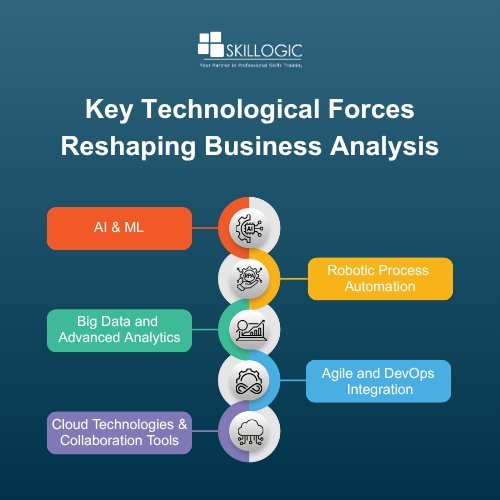The Future of Business Analysis in a Tech-Driven World
Explore how Business Analysis is evolving in a tech-driven world, with emerging tools, agile practices, and data-led decision-making shaping its future.

In a world where digital transformation is the new normal, the role of the Business Analyst is undergoing a significant shift. Organizations are no longer relying solely on intuition to make decisions — they are turning to data, technology, and automation to drive growth and efficiency. This evolving landscape demands a new kind of Business Analyst — one who is not only skilled in traditional methodologies but also fluent in emerging technologies.
As artificial intelligence, automation, big data, and cloud technologies reshape business ecosystems, Business Analysts must evolve to stay relevant. In this article, we’ll explore the current state of business analysis, the technologies reshaping the profession, the skills needed for the future, and how organizations can adapt to harness the full potential of the Business Analyst in a tech-driven world.
The Current Landscape of Business Analysis
Historically, the Business Analyst has served as a vital link between business needs and IT solutions. Their primary responsibilities include gathering requirements, analyzing processes, identifying improvement opportunities, and facilitating communication between stakeholders.
These roles remain important, but the scope is expanding. Today’s Business Analyst is expected to offer strategic insight, translate business objectives into data-driven solutions, and guide digital transformation initiatives.
Business analysts are among the most in-demand IT and engineering jobs, reflecting their critical role in data-driven decision-making. Business Research Company notes that this demand is driven by the growing need for professionals who can bridge the gap between data insights and strategic business actions, helping organizations stay competitive in rapidly evolving markets.
Read More:
- Why Every E-commerce Company Needs a Business Analyst
- How to Measure the Impact of Brand Awareness Campaigns
- How to Improve Your Business Process Mapping Skills
Common Tools and Techniques for Business Analyst
Modern Business Analysts use a range of business analyst tools such as:
Jira and Confluence:
Jira streamlines project management by monitoring tasks, coordinating agile sprint cycles, and facilitating team issue tracking.
Lucidchart and Microsoft Visio:
Lucidchart is a cloud-based tool for creating flowcharts, diagrams, and process maps that enhance visual clarity.
Microsoft Visio offers advanced diagramming capabilities for modeling workflows, organizational charts, and business processes.
SQL, Excel, and Tableau:
SQL enables Business Analysts to query and manipulate large datasets from relational databases for actionable insights.
Excel is a versatile tool for data organization, quick calculations, and scenario modeling, while Tableau visualizes complex data through interactive dashboards.
UML and BPMN:
UML (Unified Modeling Language) helps Business Analysts create detailed system diagrams that define software functionality and structure.
BPMN (Business Process Model and Notation) provides a standardized way to map out business workflows for analysis and optimization.
These business analyst tools help professionals provide comprehensive solutions that align with organizational goals.
The median salary for Business Analysts in the U.S. as of 2025 is $104,000, with entry-level positions starting around $80,350 and senior roles reaching approximately $103,232.
The demand for skilled Business Analysts continues to rise, particularly in industries like finance, healthcare, e-commerce, and logistics. According to market research, job postings for Business Analysts have seen double-digit growth annually, with a noticeable emphasis on digital and analytical skills.
Did you know? The Business Intelligence Market is expected to reach $33.3 billion by 2025, reflecting the increasing importance of data-driven decision-making in organizations. MarketsandMarkets highlights that this growth is fueled by the widespread adoption of analytics tools that help businesses uncover insights, streamline operations, and enhance performance.
Read More:
- How to become a Business Analyst in India?
- Business Analytics Scope in India
- How to Become a Business Analytics Expert in India?

Key Technological Forces Reshaping Business Analysis
Technology is not just transforming products and services — it’s also redefining how Business Analysts work and the value they bring.
Artificial Intelligence (AI) and Machine Learning
AI in business analysis is revolutionizing how Business Analysts operate. No longer limited to historical data, they can now use AI to:
- Predict customer behavior
- Automate insights generation
- Improve decision-making processes
For instance, machine learning algorithms can identify patterns in consumer behavior, which Business Analysts can use to shape targeted marketing campaigns or optimize supply chain operations.
AI-powered tools like ChatGPT, IBM Watson, and Salesforce Einstein assist Business Analysts in performing sentiment analysis, data mining, and even generating preliminary reports, enhancing both speed and accuracy.
The integration of AI in business analytics is increasing, with a rise in job postings requiring AI skills, particularly in data science and software development roles .
Big Data and Advanced Analytics
Big data for business analysts has shifted the focus of business analysis from reporting the past to forecasting the future. Business Analysts today work with vast datasets that provide deeper insights into consumer trends, operational inefficiencies, and market opportunities.
Key analytics platforms like Power BI, Tableau, and Google BigQuery enable Business Analysts to:
- Visualize complex data
- Perform real-time analysis
- Build interactive dashboards for stakeholders
Proficiency in languages like SQL and Python is becoming increasingly essential for data manipulation and advanced analytics.
Did you know? The Big Data and Analytics Services Market is anticipated to grow from USD 151.41 billion in 2024 to USD 169.01 billion in 2025, at a CAGR of 11.6%.
Robotic Process Automation (RPA)
Automation tools for business analysts are changing how organizations approach process improvement. Instead of reengineering processes manually, Business Analysts now design automation workflows that replicate repetitive human tasks.
By leveraging RPA tools like UiPath, Blue Prism, and Automation Anywhere, Business Analysts can:
- Reduce operational costs
- Increase accuracy
- Free up human capital for more strategic tasks
This technological shift allows Business Analysts to focus on high-value initiatives such as customer experience enhancement and strategic alignment.
Cloud Technologies and Collaboration Tools
Cloud tools for business analysts have transformed how Business Analysts collaborate across geographies. With platforms like Microsoft Azure, AWS, and Google Cloud Platform, data access is seamless, scalable, and secure.
Additionally, cloud-based project management tools such as Asana, Trello, and Slack foster real-time communication and agile teamwork. This enables Business Analysts to work closely with cross-functional teams and deliver faster results.
Agile and DevOps Integration
Agile and DevOps practices have transformed how Business Analysts approach and manage their workflows. No longer a separate function, the Business Analyst is now embedded in agile teams, participating in sprint planning, backlog grooming, and iterative product development.
In this context, Business Analysts often take on roles such as:
- Product Owner
- Scrum Facilitator
- Customer Advocate
This shift requires a deep understanding of both business value and technical constraints, making business analysts in DevOps environments indispensable.
Read More:
- Business Analytics Course Fee in Chennai
- Business Analytics Course Fee in Pune
- Business Analytics Course Fee in Hyderabad
Evolving Skill Set of the Modern Business Analyst
To thrive in a tech-driven world, the Business Analyst must possess a hybrid skill set. Business acumen remains critical, but it must now be complemented by technical fluency.
Future skills for business analysts include:
Essential Technical Skills Include:
- SQL and Python for data manipulation: Business Analysts use SQL to directly retrieve and interpret structured data from databases for analysis. Python supports advanced data processing, automation, and integration with machine learning models.
- Knowledge of APIs and system integrations: Understanding APIs enables Business Analysts to facilitate seamless data exchange between different software systems. It also supports collaboration with developers in designing efficient, scalable digital solutions.
- Familiarity with cloud platforms: Cloud platforms like AWS, Azure, and Google Cloud provide scalable infrastructure for data storage, processing, and collaboration. Business Analysts leverage these platforms to support remote access, security, and real-time analytics.
- Proficiency in data visualization tools: Tools like Power BI, Tableau, and Looker help translate complex datasets into interactive, digestible visual insights. These visualizations support strategic decision-making and stakeholder reporting.
In India, the average salary for a Business Analyst is approximately ₹8,34,854 per year, with salaries ranging from ₹3.0 Lakhs to ₹18.0 Lakhs per year, depending on experience and specialization
Essential Soft Skills Include:
- Critical thinking and problem-solving: Business Analysts must analyze situations objectively, identify root causes, and recommend practical solutions. This skill ensures accuracy in business recommendations and strategic planning.
- Stakeholder communication and facilitation: Effective communication helps Business Analysts gather requirements, manage expectations, and align teams. Facilitation ensures all voices are heard and consensus is reached during discussions.
- Agile mindset and adaptability: Embracing an agile mindset fosters adaptability, ongoing enhancement, and quick reaction to evolving circumstances. Adaptability is crucial as priorities, tools, and technologies evolve in dynamic environments.
- Design thinking and innovation: Design thinking empowers Business Analysts to focus on user-centric solutions and creative problem-solving. This approach drives innovation by combining empathy, ideation, and rapid prototyping.
Business Analysts must also understand cybersecurity fundamentals, data governance, and compliance regulations, especially in industries like healthcare and finance.
The future of business analysis is not only promising — it's critical to organizational success in a tech-driven world. As artificial intelligence, big data, automation, and cloud computing redefine business operations, the role of the Business Analyst must evolve accordingly.
By embracing technology, acquiring new skills, and positioning themselves as strategic partners, Business Analysts can lead the charge in digital transformation. Organizations that recognize and invest in this evolution will be better equipped to navigate disruption and seize new opportunities.
If you're looking to break into this rapidly growing field or elevate your current role, the right training can be a game-changer. Enrolling in a Business Analyst course in Chennai is a strategic step toward seizing opportunities in the evolving digital economy.
SKILLOGIC’s Offline Business Analyst course in Chennai provides practical, hands-on learning led by industry experts, along with globally recognized certifications. With a decade-long presence across major Indian cities, SKILLOGIC delivers in-demand skills across business analytics, Six Sigma, PMP, cybersecurity, and cloud technologies—empowering you to succeed in today's fast-paced, tech-driven landscape.

 admin
admin
0
361